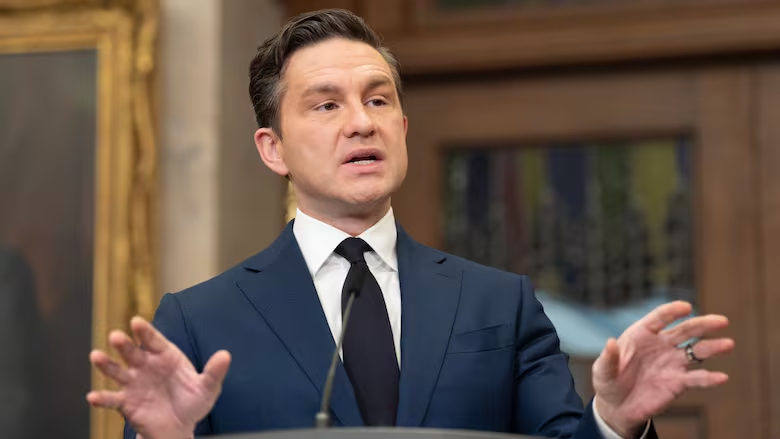Pierre Poilievre Poised to Lead Canada After Justin Trudeau’s Resignation
Ottawa, January 6, 2025 — Canada is bracing for a significant political shift as Prime Minister Justin Trudeau steps down after nearly a decade in power. Conservative Party leader Pierre Poilievre is emerging as the front-runner to replace him, signaling a potential pivot in the country’s governance and policies.
Trudeau announced his resignation following mounting pressure from within his Liberal Party, declining public support, and criticism over his handling of key issues, including economic management and relations with the United States. This political upheaval sets the stage for what could be one of Canada’s most transformative leadership changes in years.
Trudeau’s Resignation and Legacy
Trudeau’s resignation marks the end of an era characterized by progressive policies, international acclaim, and controversy. Elected in 2015 on promises of “sunny ways,” Trudeau’s government introduced landmark initiatives, including the legalization of cannabis, a national climate action plan, and expanded child benefits. However, his tenure was also marred by scandals, economic challenges, and dissatisfaction over housing affordability and inflation.
Trudeau cited parliamentary gridlock and the need to focus on Canada’s best interests as reasons for his departure. “Leadership means knowing when it’s time to step aside,” he said in his resignation speech. “I leave knowing that we have accomplished much, but recognizing that new leadership is needed to move Canada forward.”
The Liberal Party is now tasked with selecting a successor, with prominent figures like former Finance Minister Chrystia Freeland and former Bank of Canada Governor Mark Carney expected to contend for the role.
Pierre Poilievre’s Rise
As Trudeau exits, Pierre Poilievre, the leader of the Conservative Party since 2022, is emerging as the leading contender to assume Canada’s top political role. Poilievre has positioned himself as a staunch critic of Trudeau’s policies, particularly on economic issues, taxes, and government spending.
Under Poilievre’s leadership, the Conservative Party has gained significant ground, securing victories in key by-elections and surging ahead in national polls. His platform emphasizes reducing taxes, repealing the carbon tax, and addressing affordability issues—a message that has resonated with many Canadians struggling with rising living costs.
Known for his direct and sometimes combative rhetoric, Poilievre has drawn comparisons to former U.S. President Donald Trump for his populist style and skepticism toward traditional media outlets. However, he has also garnered praise for his sharp focus on economic freedom and individual rights.
Policy Shifts on the Horizon
If Poilievre becomes Canada’s next prime minister, significant policy changes are expected, particularly in taxation, energy, and economic governance. His pledge to repeal the carbon tax would represent a departure from the current administration’s climate policies, which have prioritized reducing emissions and transitioning to renewable energy.
Poilievre’s emphasis on energy independence and reducing government intervention aligns with his broader vision of a market-driven economy. “Canada needs a government that gets out of the way of its people and lets them succeed,” he said during a recent speech.
On social issues, Poilievre has taken a more cautious approach, aiming to appeal to a wide range of voters while focusing on his core economic message.
Challenges Ahead
Despite his rising popularity, Poilievre faces challenges in uniting a diverse electorate and addressing Canada’s complex policy landscape. Key issues such as healthcare reform, indigenous relations, and international trade will require a careful balancing act to maintain public support while advancing his agenda.
The Conservative Party leader also faces scrutiny over his ability to deliver on ambitious promises, particularly as Canada navigates economic uncertainty and a changing global landscape.
Economic Concerns and U.S. Relations
One of the central criticisms of Trudeau’s government—and a key focus for Poilievre—has been the state of Canada’s economy. High inflation, housing shortages, and strained trade relations with the U.S. have fueled public frustration.
With President-elect Donald Trump preparing to impose a 25% tariff on Canadian goods, Poilievre has vowed to take a more assertive stance in trade negotiations. “Canada must stand strong in defending its economic interests,” he recently stated, emphasizing the need for a strategic approach to U.S.-Canada relations.
The Liberal Party’s Next Steps
Trudeau’s resignation has triggered a leadership race within the Liberal Party, with Freeland and Carney among the top contenders. Both are seen as capable leaders who could help the party rebuild and counter Poilievre’s growing influence.
Freeland, who served as Trudeau’s finance minister and deputy prime minister, is widely respected for her economic expertise and diplomatic skills. Carney, a former central banker, brings a global perspective and economic acumen that could appeal to a broad voter base.
Public Reaction
Trudeau’s resignation and Poilievre’s potential ascent have sparked mixed reactions across Canada. Supporters of Poilievre see his leadership as a necessary shift toward economic freedom and fiscal responsibility, while critics fear that his policies could undermine environmental protections and social programs.
Meanwhile, Liberal Party supporters are rallying behind potential successors, hoping to reinvigorate the party and present a viable alternative in the next election.
As Canada prepares for this significant political transition, the focus shifts to how the nation will navigate its immediate challenges, including economic recovery, international relations, and climate change. Poilievre’s rise signals a potential shift in Canada’s political landscape, but the path forward remains uncertain.
With the Liberal Party regrouping and the Conservatives poised to capitalize on their momentum, the coming months will be pivotal in shaping Canada’s future. For now, Pierre Poilievre stands at the forefront of a new political era, ready to lead a nation seeking solutions to its most pressing concerns.

